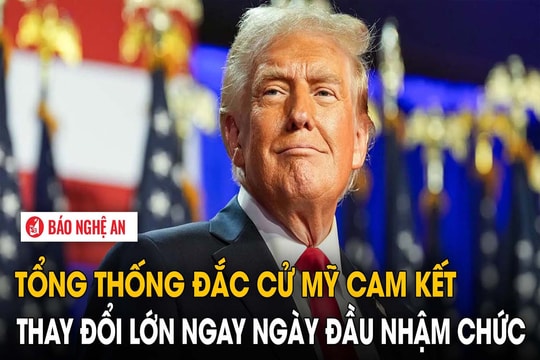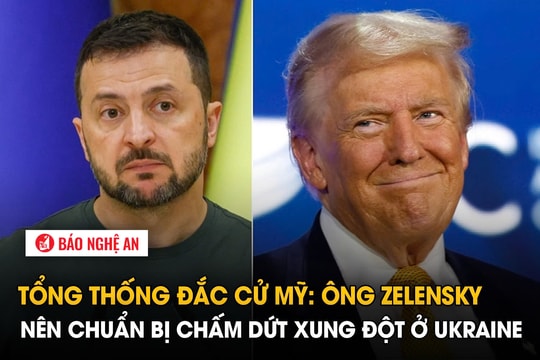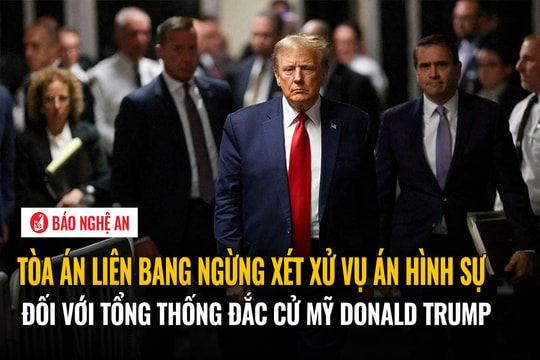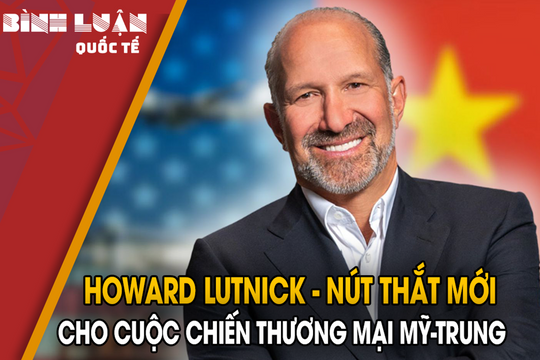Inside the billion-dollar empire that is Trump's power platform
Unlike other billion-dollar business empires, the Trump Organization is like a family business, where love and loyalty are always top priorities.
 |
Donald Trump (center) appears with his son Donald Jr. (left) and Malaysian real estate developer Tiah Joo Kim in 2013. Photo: Canadian Press |
Before Tiah Joo Kim arrived at the Trump Organization’s Manhattan headquarters to pitch a hotel and condominium project in Vancouver, British Columbia, he imagined a globally renowned company like the Trump Organization would have hundreds of offices and thousands of employees. Instead, he was shown just two floors with a handful of offices and a few dozen employees.
The first stop was a conference room, where Tiah had to pitch the project to the boss’s three eldest children. Only after they approved it could Tiah move on to the most important room with a window overlooking New York’s Central Park, where Donald Trump, the company’s most powerful voice, was waiting, according to the New York Times.
Tiah at that time, one afternoon in 2012, did not hold any expectations about meeting with the famous Trump but according to him everything went smoothly and warmly.
Instead of discussing the business plan Tiah brought, the New York tycoon spent a lot of time showing off a pair of shoes given to him by famous American basketball player Shaquille O'Neal and a championship belt given to him by boxer Mike Tyson as souvenirs for his contributions to sports.
“You look good,” Tiah recalled Mr. Trump saying.
Then the billionaire’s top lawyers and executives stepped in. They negotiated a deal that would allow the Vancouver project to be branded Trump and managed by the Trump Organization. The discussions continued for 16 hours a day for a week.
"It was tiring. They were extremely tough," Tiah described.
That's how work gets done at the Trump Organization, a company with enormous influence and at the center of a public storm as its owner prepares to become the 45th president of the United States.
With a worldwide network, the Trump Organization has the potential to create many conflicts of interest once Mr. Trump becomes US president, experts say.
The New York tycoon said in mid-month that although he is not required by law, he plans to remove himself and his daughter Ivanka from all activities in the company to avoid creating conflicts of interest. His two sons, Donald Jr. and Eric, will still be responsible for the company.
But in recent weeks, under pressure from the public, Trump and his advisers have been discussing other options. The New York tycoon has agreed to close a personal charity, end some international deals and come up with a new plan that would allow him to keep an outside eye on the Trump Organization.
Observers say Trump’s company is a typical family business, gathering loyal, long-time employees, operating without standards but mainly based on Trump culture. The American billionaire may hand over work to his deputies, but it is clear that his name and influence are stamped on every contract the company executes.
In an interview with the New York Times last year, Trump explained that he often approves new projects based on “intuition.” Although his children have taken on a larger role in the company in recent years, he still has the final say at the most important moments.
Many of the Trump Organization’s top executives hail from the New York neighborhood of Queens, where Mr. Trump grew up, or Brooklyn, where his father built his business. They have risen to important positions not on merit but on decades of dedication to their boss.
For example, Allen Weisselberg, the chief financial officer, started out as an accountant working for Trump's father, Fred, and Matthew Calamari, the chief administrative officer, was hired in 1981.
For some executives, serving the company comes with serving the Trump family.
“We’re not a publicly traded company. At the end of the day, I still work for the Trump family,” Alan Garten, a lawyer representing the Trump Organization, said in an interview in November. “That’s how I look at it. Whether it’s protecting the company’s interests or their personal interests, I’m here to support and represent them, whenever they need me.”
Family Store
 |
Ivanka Trump, Mr. Trump's daughter, at her office in Trump Tower, Midtown Manhattan, New York. Photo: New York Times |
Despite owning a series of businesses around the world, Donald Trump's center of power is still located at Trump Tower, 725 Fifth Avenue, Midtown Manhattan, New York.
To get to work, Mr. Trump simply takes his penthouse apartment in the tower, enters his private elevator, presses 26 and waits a moment. When the door opens, his private office appears with top executives waiting. One floor below is the office of his three children, Donald Jr., Eric and Ivanka Trump.
Trump’s office walls are adorned with dozens of photos of the New York tycoon posing with the world’s rich and powerful. His desk is covered with papers.
When he wants to speak to someone, Trump calls his assistant, Rhona Graff, who sits just outside. She has worked as the New York tycoon’s gatekeeper for decades. Anyone calling Trump must go through her, sometimes even with a password.
Mr. Trump frequently boasts about the enormous size of the Trump Organization. A spokesman for the New York tycoon once claimed that the company had “tens of thousands of employees.” But industry experts estimate that the Trump Organization has only about 4,000 employees worldwide. The three floors of the company’s headquarters have no more than 150 employees.
Donald Trump Jr. described the Trump Organization as being run like “a family grocery store” in 2011. “I guess we have an organizational chart, but technically we don’t have a lot of hierarchy,” Trump Jr. said.
In fact, Mr. Trump often picks executives and assigns jobs based on his personal interests. In 2004, Michelle Carlson, then a young lawyer, approached Mr. Trump for a letter of recommendation from a friend. She wanted to become a real estate developer in Los Angeles.
Carlson said she was greeted warmly. “I heard there was a beautiful Atlanta girl waiting in the lobby,” Carlson recalled Trump telling her. After inviting her to sit down, the tycoon asked a series of direct questions: What are her responsibilities in her current job? What do you think your strengths are? What areas do you want to develop?
In less than 45 minutes, Trump was convinced. “I’m not going to give you a letter of recommendation in Los Angeles. I’m going to hire you,” Trump told Carlson.
Carlson then spent nearly four years as a legal assistant to Mr. Trump, often working 18-hour days with a small team of lawyers, while also doing other work in the real estate department.
For Tiah, when he arrived at Trump Tower to discuss the partnership in Vancouver, he couldn’t help but notice that all the female employees at the Trump Organization had at least one thing in common. “You have to be attractive? Is that a requirement?” Tiah remembers thinking.
The Price of Loyalty
 |
The desk of US President-elect Donald Trump. Photo: New York Times |
Andrew Weiss, a Romanian immigrant who grew up in Brooklyn, was hired by Trump right out of college in 1981. After 35 years of ups and downs at Trump’s side, Weiss is now executive vice president of development and construction. Weiss knows better than most what loyalty means to the New York tycoon.
“To be successful in this company, you must have skill, passion and absolute loyalty,” Garten's attorney asserted.
During the campaign, Michael Cohen, one of the executive vice presidents of the Trump Organization, threatened the Daily Beast when the news site was about to publish an article that could damage the New York tycoon’s reputation. If it published the article, Cohen fiercely declared, according to a source familiar with the Daily Beast.
In an interview, Cohen shared that "for those close to him, Trump is more than a boss."
“He was like a mentor,” Cohen said. “Those qualities endeared me to Trump. That’s why I pledged my loyalty and determination to protect him at all costs.”
Big family
Jill Cremer, a former vice president at the Trump Organization, was always impressed by the lavish Christmas parties the company threw for its employees, during which Mr. Trump would hand out gifts—usually plane tickets, cameras, or suitcases—to employees and then pose for photos with them.
“The Christmas party is a highlight,” Cremer said. “It’s really a family affair.”
This year, the party was held on the evening of December 14, two days after Trump announced he would postpone announcing his plan to handle the company's problems after he became president.
Despite being busy with a mountain of work related to the power transition process, Trump still took time to stop by the Trump Tower hall to attend the party.
As the employees were enjoying a memorable night, the New York tycoon took the stage and thanked everyone for helping him build a great company.
“You could see the love in the room,” said his son, Eric Trump.
According to VNE




.jpg)


